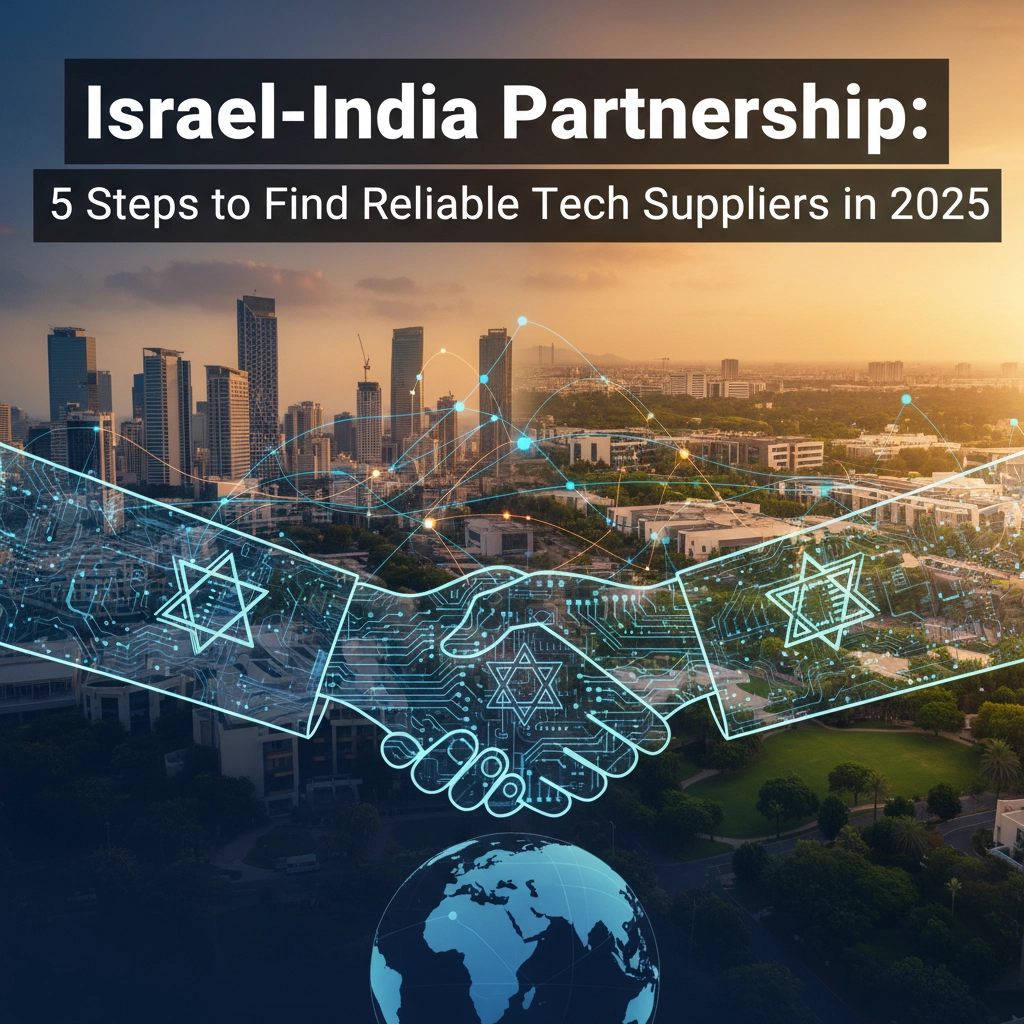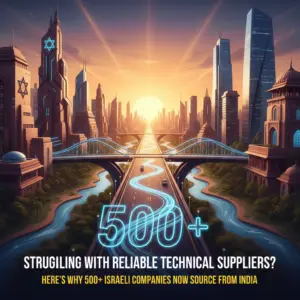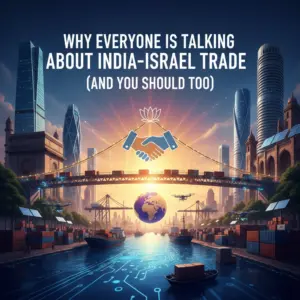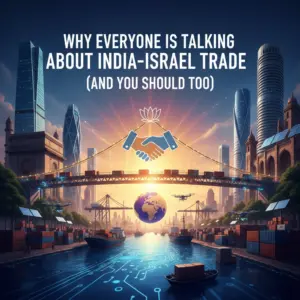The tech world is buzzing about the India-Israel partnership, and for good reason. With over 50 Indian tech companies actively seeking Israeli partnerships and a massive $40 million joint fund backing collaborative projects, this bilateral relationship has become one of the hottest opportunities for sourcing reliable tech suppliers.
If you're an Israeli company looking to tap into India's incredible tech ecosystem, you're in luck. The partnership framework is stronger than ever, with government backing, established networks, and proven success stories. But here's the thing – you need to know exactly how to navigate this landscape to find the right partners.
Let's break down the five essential steps that'll help you connect with reliable Indian tech suppliers in 2025.
Step 1: Start with Government-Backed Partnership Programs
Your first move should be leveraging the India-Israel Industrial R&D and Technological Innovation Fund (I4F). This isn't just another bureaucratic program – it's a game-changer that offers serious financial support for joint projects.
Here's what makes the I4F so valuable: Israeli organizations can get between $0.25 million to $1.25 million USD per project, or 50% of the Israeli project cost, whichever is lower. That's real money backing your supplier relationships from day one.
The program covers four different tracks:
- Feasibility studies – Perfect for testing the waters with potential suppliers
- R&D projects – For deeper collaboration on technology development
- Pilot projects – When you're ready to scale up successful partnerships
- Strategic projects – The big leagues, with grants up to $5 million launched as recently as October 2024
Since the program was renewed for 2023-2027, you've got a solid window to establish these government-backed relationships. The fund has already supported thirty-four projects across agriculture, water, energy, healthcare, and ICT sectors, proving its effectiveness across diverse tech domains.

Step 2: Connect Through Established Business Networks
Don't try to go it alone when established networks are ready to help. The India-Israel Chamber of Commerce and similar organizations aren't just networking events – they're your gateway to vetted suppliers and crucial market intelligence.
These networks give you access to companies that have already been through initial vetting processes. You'll get insights into which Indian tech firms are genuinely committed to Israeli partnerships versus those just testing the waters.
Key players to connect with include:
- Global Innovation & Technology Alliance (GITA) on the Indian side
- Israel Innovation Authority – your home base for partnership support
- Startup Nation Central – which has partnered with India's International Centre for Entrepreneurship and Technology (iCREATE)
These organizations don't just make introductions; they actively support companies in finding suitable partners and can provide market intelligence that would take you months to gather independently.
Step 3: Target Major Indian Tech Companies Already Engaged in Israeli Markets
Why reinvent the wheel? Focus on established Indian companies that have already demonstrated commitment to Israeli partnerships through real investments and successful collaborations.
The numbers tell the story: Tech giants like TCS, Infosys, Tech Mahindra, and Wipro have collectively invested $118 million in the Israeli market by 2019. These aren't experimental partnerships – they're serious, long-term commitments.
In the defense sector, companies such as Bharat Forge, Adani Defence and Aerospace, and Tata Advanced Systems are actively partnering with Israeli defense leaders including IAI, Elbit Systems, and Rafael Advanced Defense Systems. These partnerships have already produced tangible results, like the Adani-Elbit joint venture manufacturing UAVs like the Drishti-10 Starliner – the only facility outside Israel producing this advanced drone system.

The semiconductor space offers particularly strong opportunities. The International Semiconductor Consortium has announced $3 billion in investments for manufacturing facilities in Mysuru, creating direct pathways for Israeli companies to access Indian semiconductor manufacturing capabilities.
Step 4: Align with India's Manufacturing Strengths and Market Potential
Here's where the numbers get really exciting. India's electronics manufacturing market is expected to reach $300 billion by 2026, and the chip market will hit $110 billion by 2030. Even more impressive? One-fifth of the world's semiconductor designers are Indian.
This creates perfect complementarity with Israel's R&D expertise. You bring the innovation, they bring the manufacturing scale and talent pool. It's a match made in tech heaven.
Focus on sectors where Indian companies are actively seeking Israeli technology partners:
- Defense manufacturing – especially advanced sub-systems and homeland security tech through "Make in India" initiatives
- Cybersecurity – where Israeli expertise meets Indian implementation scale
- Semiconductors – leveraging India's massive talent pool and new manufacturing investments
- Emerging technologies – AI, IoT, and next-gen communication systems
The key is understanding that Indian companies aren't just looking for suppliers – they want technology partners who can help them move up the value chain.
Step 5: Structure Long-Term Strategic Partnerships Beyond Traditional Supplier Relationships
This is where most companies get it wrong. They approach Indian firms with a traditional buyer-supplier mindset, but what Indian tech companies really want are genuine partnerships involving joint R&D, co-development, and shared market expansion strategies.
Think beyond simple procurement. Indian companies are specifically looking for:
- Collaboration on technology development – sharing both costs and intellectual property
- Joint R&D initiatives – combining Israeli innovation with Indian implementation
- Long-term strategic relationships – not just transactional supplier agreements
- Technology transfer opportunities – helping Indian partners develop local capabilities
Consider establishing local presence following successful models like Israel Aerospace Industries (IAI), which opened their first NeuSPHERE office in New Delhi. This office focuses on supporting innovation and building technology capabilities with local startups, creating a pipeline of potential partners and suppliers.

The Partnership is Already Delivering Results
The proof is in the success stories. Indian-Israeli ventures are positioning themselves as alternatives to U.S. suppliers for various defense systems and munitions. This isn't theoretical – it's happening right now.
The bilateral Science & Technology cooperation, overseen by the Joint Committee established in 1993, continues to evolve. The most recent India-Israel Joint Research Program (IIJRC) 2023 focuses on AI applications in climate change and agriculture for food security, demonstrating the expanding scope of collaborative opportunities.
Making Your Move in 2025
The India-Israel tech partnership isn't just a diplomatic nicety – it's a serious business opportunity backed by government funding, established networks, and proven success stories. The companies that succeed will be those that understand this isn't about finding cheaper suppliers, but about finding strategic partners who can help scale innovation globally.
Start with the I4F program to get government backing for your partnership exploration. Use established networks to identify vetted potential partners. Focus on companies that have already demonstrated commitment to Israeli markets. Align with India's massive manufacturing strengths and market potential. And most importantly, think partnerships, not just suppliers.
The infrastructure is there, the funding is available, and the success stories are multiplying. The question isn't whether the India-Israel tech partnership will continue growing – it's whether your company will be part of that growth story.
The time to move is now. The partnerships you establish in 2025 could define your company's growth trajectory for the next decade.




